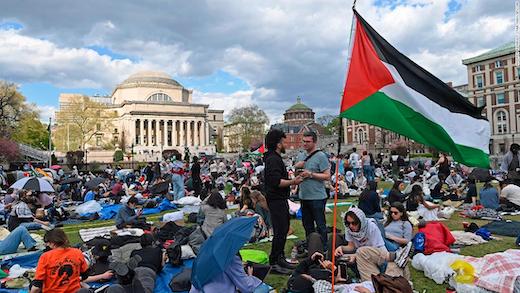Anyone who imagines there is something resembling academic freedom in the US, or elsewhere in the West for that matter, needs to read this article in the Intercept on an extraordinary – or possibly not so extraordinary – episode of censorship of a Palestinian academic. It shows how donors are the ones really pulling the strings in our academic institutions.
Here’s what happened:
1. The prestigious Harvard Law Review was due to publish its first-ever essay by a Palestinian legal scholar late last year, shortly after Hamas’ October 7 attack in Israel. Hurrah (finally) for academic freedom!
2. However, the essay, which sought to establish a new legal concept of the Nakba – the mass expulsion of Palestinian civilians from their homeland in 1948 to create what would become the self-defined Jewish state of Israel – was pulled at the last moment, despite the fact the editors had subjected it to intense editorial checks and scrutiny. The Harvard Review got cold feet – presumably because of the certainty the essay would offend many of the university’s donors and create a political backlash.
3. Editors at the rival Columbia Law Review decided to pick up the baton. They asked the same scholar, Rabea Eghbariah, to submit a new, much longer version of the essay for publication. It would be the first time a Palestinian legal scholar had been published by the Columbia Law Review too. Hurrah (finally) for academic freedom!
4. Aware of the inevitable pushback, 30 editors at the Review spent five months editing the essay, but did so in secret and mostly anonymously to protect themselves from reprisals. The article was subjected to unprecedented scrutiny.
5. Alerted to the fact that the essay had been leaked and that pressure was building from powerful figures associated with Columbia university and the Washington establishment to prevent publication, the editors published the article this month, unannounced, on the Review’s website. Hurrah (finally) for academic freedom!
6. But within hours, the Review’s board of directors, comprising law professors and alumni, some with official roles in the federal government, demanded that the essay be taken down. When the editors refused, the whole website was pulled offline. The homepage read “Website under maintenance.”
7. Hurrah for… the Israel lobby (again).
If even the academic community is so browbeaten by donors and the political establishment that they dare not allow serious academic debate, even over a legal concept, what hope is there that politicians and the media – equally dependent on Big Money, and even more sensitive to the public pressure of lobbies – are going to perform any better.
University complicity in the Gaza genocide – brought out of the shadows by the campus protests – highlights how academic institutions are tightly integrated into the political and commercial ventures of western establishments.
The universities’ savage crackdown on the student encampments – denying them any right to peacefully protest complicity in genocide by the very institutions to which they pay their fees – further underscores the fact that universities are there to maintain the semblance of free and open debate but not the substance. Debate is allowed but only within strictly controlled, and policed, parameters.
Academic institutions, politicians and the media speak as one on the Gaza genocide for a reason. They are there not promote a dialectics in which truth and falsehood can be tested through open discussion, but to confer legitimacy on the darkest agendas of the establishment they serve.
Our public debates are rigged to avoid topics that would be difficult for western elites to counter, like their current support for genocide in Gaza. But the very reason we have a genocide in Gaza is because lots of other debates we should have had decades ago have not been allowed to take place, including the one Eghbariah was trying to raise: that the Nakba that began in 1948 and has continued ever since for the Palestinian people needs its own legal framework that incorporates apartheid and genocide.
Israel’s genocide in Gaza was made possible precisely because western establishments avoided any meaningful scrutiny of, or engagement with, the events of the Nakba for more than 75 years. They pretended either that the ethnic cleansing of 1948 never happened, or that it was the Palestinians’ choice to ethnically cleanse themselves.
In the decades that followed, western establishments pretended that the illegal colonisation of Palestine by Jewish settlers and the reality of apartheid rule faced by Palestinians – hidden under the rubric of a “temporary occupation” – either weren’t happening, or could be solved through a bogus, bad-faith “peace process”.
There was never accountability, there was no truth or reconciliation. The western establishment are still furiously avoiding that debate 76 years on, as Eghbariah’s experiences at the hands of the Harvard and Columbia Law Reviews prove.
We can only pray we don’t have to wait another three-quarters of a century before western elites consider acknowledging their complicity in the genocide of Gaza.
The post Academia is only as free as powerful donors allow it to be first appeared on Dissident Voice.This post was originally published on Dissident Voice.
